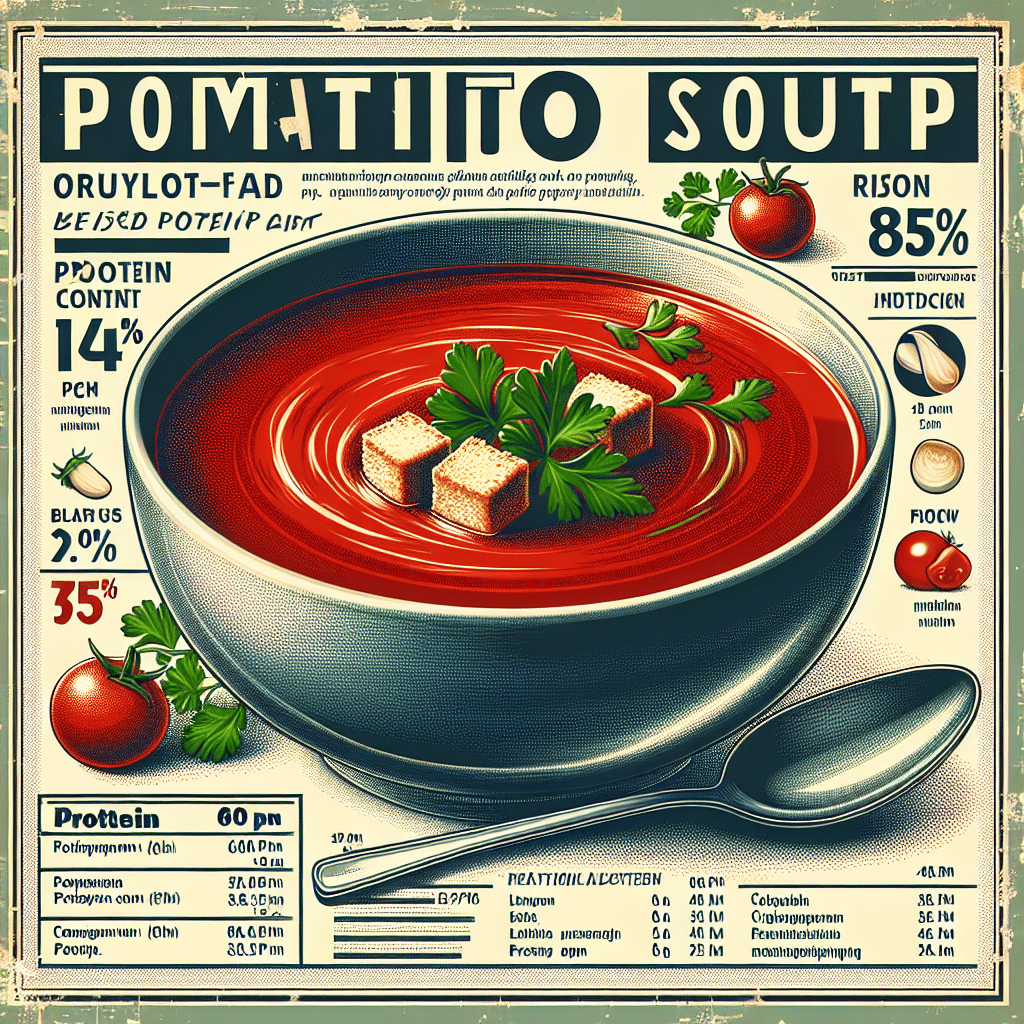Protein in Tomato Soup: Nutritional Facts Uncovered
-
Table of Contents
- Protein in Tomato Soup: Nutritional Insights and Benefits
- The Nutritional Profile of Tomato Soup
- Protein Content in Different Types of Tomato Soup
- Comparing Protein Sources
- Health Benefits of Protein in Tomato Soup
- Maximizing Protein in Tomato Soup
- Case Studies and Statistics
- Considerations and Recommendations
- Conclusion: The Role of Protein in Tomato Soup
- Discover ETprotein’s High-Quality Protein Products
Protein in Tomato Soup: Nutritional Insights and Benefits

Tomato soup is a classic comfort food enjoyed by many around the world. Its rich flavor and warm, soothing properties make it a favorite, especially during colder months. However, beyond its taste and comfort value, tomato soup also holds various nutritional benefits, including its protein content. In this article, we will uncover the nutritional facts of protein in tomato soup, its health benefits, and how it can be a part of a balanced diet.
The Nutritional Profile of Tomato Soup
Tomato soup is primarily known for its high vitamin C and antioxidant content, thanks to the lycopene found in tomatoes. However, it also contains protein, which is vital for building and repairing tissues, making enzymes and hormones, and supporting immune function. The amount of protein in tomato soup can vary depending on the recipe and additional ingredients used.
Protein Content in Different Types of Tomato Soup
- Homemade Tomato Soup: The protein content in homemade tomato soup can vary. If it’s made with fresh tomatoes and vegetable broth, the protein content will be relatively low. However, adding ingredients like milk, cream, or cheese can increase the protein content.
- Canned Tomato Soup: Most canned tomato soups contain about 2 grams of protein per serving. However, this can increase if the soup is prepared with milk instead of water.
- Tomato Soup with Add-Ins: Adding beans, lentils, or meat to tomato soup can significantly boost its protein content, making it a more substantial meal.
Comparing Protein Sources
While tomato soup does contain protein, it’s important to note that it’s not as high in protein as other sources like meat, dairy, or legumes. However, for those looking for a light meal or a way to add a bit more protein to their diet, tomato soup can be a good option.
Health Benefits of Protein in Tomato Soup
Protein is an essential macronutrient that plays a crucial role in the body. Here are some of the health benefits of consuming protein through tomato soup:
- Muscle Maintenance: Protein is essential for muscle growth and repair. Consuming adequate protein can help maintain muscle mass, which is particularly important as we age.
- Weight Management: Protein can increase satiety, which may help with weight management by reducing overall calorie intake.
- Immune Function: Antibodies, which are crucial for immune defense, are made of protein. A diet with adequate protein supports a healthy immune system.
- Enzymes and Hormones: Many enzymes and hormones, which regulate bodily functions, are proteins.
Maximizing Protein in Tomato Soup
To increase the protein content in tomato soup, consider the following additions:
- Add dairy: Incorporate milk, cream, or cheese to not only enhance creaminess but also boost protein.
- Include legumes: Beans and lentils are excellent plant-based protein sources that can be added to tomato soup.
- Use meat or poultry: Chicken, beef, or turkey can be included for a higher protein meal.
- Protein powders: Some individuals opt to add unflavored protein powders to their soup for an extra protein kick.
Case Studies and Statistics
Research has shown that diets with adequate protein can support health in various ways. For instance, a study published in the “American Journal of Clinical Nutrition” found that higher protein intake was associated with better muscle mass retention in older adults. Another study indicated that protein-rich meals could lead to greater feelings of fullness, which may aid in weight management.
Considerations and Recommendations
While tomato soup can contribute to your daily protein intake, it should be part of a varied diet that includes other protein sources. It’s also important to consider the sodium content in canned or pre-made tomato soups, as they can be high. Opting for low-sodium versions or making soup from scratch can help manage sodium intake.
Conclusion: The Role of Protein in Tomato Soup
Tomato soup can be a nutritious addition to a balanced diet, offering not only comfort but also a modest amount of protein. By understanding the nutritional content and considering ways to enhance the protein in tomato soup, individuals can enjoy this classic dish as part of a healthy lifestyle. Remember to complement tomato soup with other protein-rich foods to meet your daily nutritional needs.
Discover ETprotein’s High-Quality Protein Products
If you’re looking to increase your protein intake, consider exploring ETprotein’s range of plant-based protein products. Their organic and non-GMO protein powders can be a great addition to your diet, whether you’re looking to fortify your tomato soup or enhance other recipes. With a neutral taste and allergen-free attributes, ETprotein’s offerings are suitable for various dietary preferences and needs.
About ETprotein:
ETprotein, a reputable plant protein vegan protein Chinese factory manufacturer and supplier, is renowned for producing, stocking, exporting, and delivering the highest quality organic bulk vegan protein and plant proteins. They include Organic rice protein, clear rice protein, pea protein, clear pea protein, watermelon seed protein, pumpkin seed protein, sunflower seed protein, mung bean protein, peanut protein etc. Their offerings, characterized by a neutral taste, non-GMO, allergen-free attributes, cater to a diverse range of industries. They serve nutraceutical, pharmaceutical, cosmeceutical, veterinary, as well as food and beverage finished product distributors, traders, and manufacturers across Europe, USA, Canada, Australia, Thailand, Japan, Korea, Brazil, and Chile, among others.
ETprotein specialization includes exporting and delivering tailor-made protein powder and finished nutritional supplements. Their extensive product range covers sectors like Food and Beverage, Sports Nutrition, Weight Management, Dietary Supplements, Health and Wellness Products, and Infant Formula, ensuring comprehensive solutions to meet all your protein needs.
As a trusted company by leading global food and beverage brands and Fortune 500 companies, ETprotein reinforces China’s reputation in the global arena. For more information or to sample their products, please contact them and email sales(at)ETprotein.com today.












